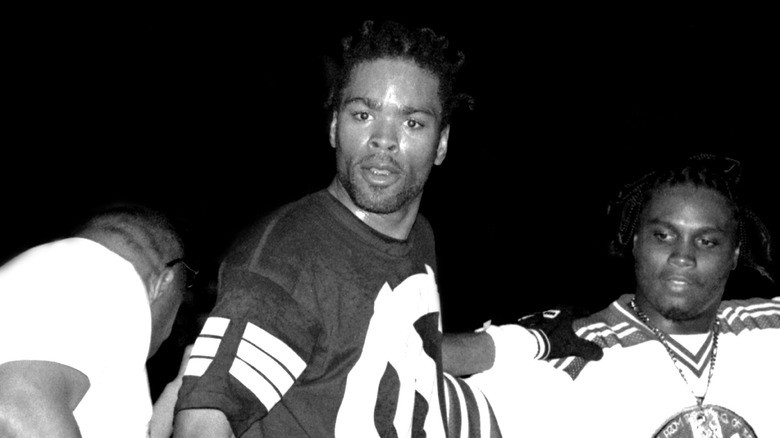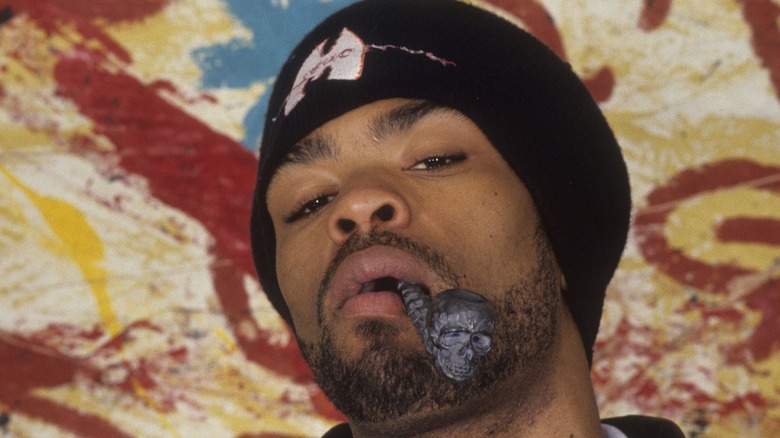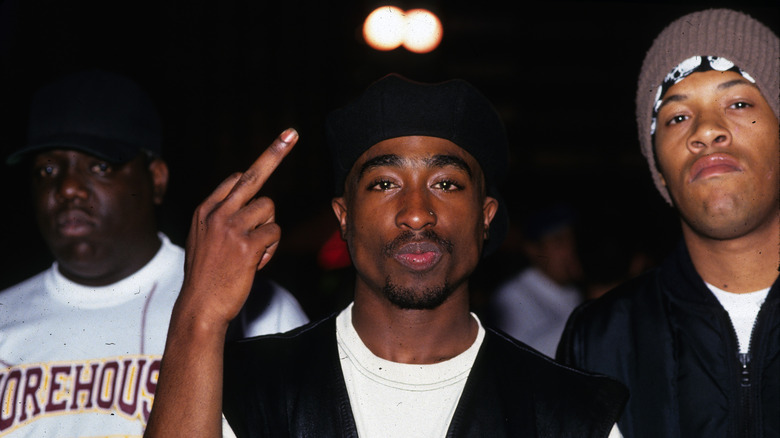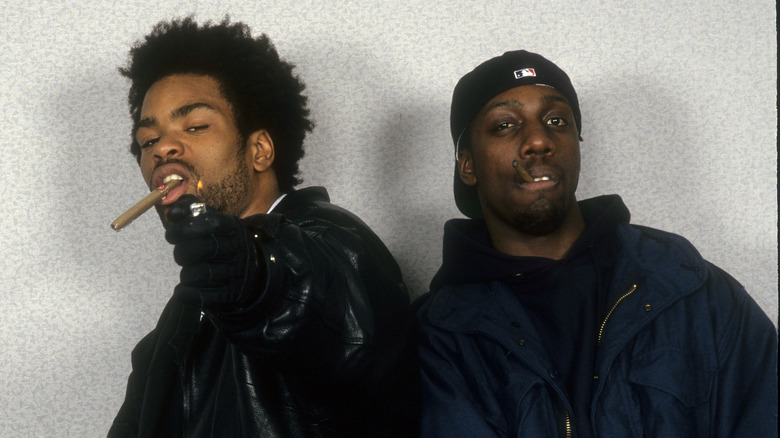The Untold Truth Of Method Man
"Domination baby," replied Clifford Smith Jr., aka Method Man, when asked the ultimate goal of his crew, the Wu-Tang Clan. He made the comment in an interview included on their seminal debut album, 1993's "Enter The Wu-Tang (36 Chambers)." And looking back on the influential hip-hop group's enduring success — which includes scores of albums by its members and affiliates, with millions upon millions of units sold — you have to say that domination is exactly what the Wu-Tang achieved.
The crew's stranglehold on hip-hop is thanks in part to innovative planning of the group's de facto leader, RZA, who produced the vast majority of the Wu's early material and devised a "five-year plan" to bring the nine-man crew to prominence through crew and solo albums, according to NPR. But undoubtedly, much of the group's appeal to listeners in the early days was thanks to Smith. Undeniably, his silky flow and instantly recognizable voice across numerous intricate verses and catchy hooks — most notably on "C.R.E.A.M.," considered by many fans to be the Wu-Tang Clan's masterpiece — made him the Wu's star rapper. Here are some little-known facts about the lyricist, also known as Johnny Blaze, Shakwon, and the Ticallion Stallion.
Method Man's near-death experience
It is no secret that life was hard for many members of the Wu-Tang Clan before the collective formed like Voltron and became one of the most prominent crews in hip-hop. Indeed, the lyrics to songs such as "C.R.E.A.M." read as memoirs of difficult childhoods and adolescences of young men attempting to survive the crime and poverty of their early lives in Staten Island. And the truth is that, according to RZA, Clifford Smith was very close to never becoming the famous Method Man at all.
Per XXL, the Clan producer claims that Smith very nearly lost his life in a drive-by shooting months before the group released its first single. Luckily, his life was saved when RZA called his name in the street, causing Smith to move out of the line of fire that would have otherwise killed him. Though we can only speculate hypothetically, it seems unlikely that the Wu-Tang Clan would have had such an impact on hip-hop or such enduring success and popularity if Smith — arguably the group's most charismatic and instantly recognizable member — perished that day.
The lost version of Tical
Just as the song "Method Man" gave Clifford Smith a spotlight on "Enter The Wu-Tang (36 Chambers)" and helped make him an early fan favorite, his prominence during the Wu-Tang's early years was cemented in 1994 by the arrival of "Tical." It was the rapper's debut solo album and the first to be released by a member of the Wu under their own name. Notably, the album set a high benchmark for future solo Wu releases in its uncompromising sound and both its critical and commercial performance.
The Source notes that "Tical" made it to No. 4 on the Billboard 200 — an impressive feat for a hip-hop album at the time — and to No.1 on the R&B/Hip-Hop chart, eventually going double platinum. The album was supported by singles demonstrating Smith's incredible range: "Bring The Pain" pleased purists for its continuation of the grittiness that defined the Wu-Tang Clan's debut, while "All I Need" saw the rapper moving into more traditional romantic territory. The song was remixed twice to include a feature by Mary J. Blige and hit No. 3 on the charts, later going platinum (via the RIAA).
But though Smith's early solo material turned out to be a success, it later emerged that the original recordings of his debut were lost in a devastating flood in RZA's studio, where production on the Wu's first batch of solo records was underway, per Ambrosia For Heads. The album had to be rerecorded from scratch, and a great deal of material by fellow Wu members Inspectah Deck, GZA, Raekwon, and Ghostface Killah was also destroyed.
The only rapper to feature for both Biggie and 2Pac
If the Wu-Tang Clan is the first hip-hop crew that comes to mind when we think about 1990s rap today, two rappers vie for the title of the decade's most prominent solo act: 2pac (center) and the Notorious B.I.G. (left). The former friends turned rivals represented the West and East Coasts, respectively, and their feud would tragically end with the deaths of both artists while still only in their 20s. Even today, both 2Pac and Biggie are typically contenders for greatest rapper of all time.
As it turns out, Method Man holds an interesting honor in the hip-hop firmament: He is the only rapper to appear as a guest performer on albums by both artists during their lifetimes, according to Daily Rap Facts. This impressive feat is an indicator of Meth's ubiquity following his breakthrough. First, Clifford Smith appeared as a guest for Biggie on the classic "The What," an album track from the East Coast rapper's 1994 debut, "Ready to Die." Then, in 1996, Meth provided verses for 'Pac's platinum-selling album "All Eyez on Me," guesting on "Got My Mind Made Up" alongside members of The Dogg Pound and, decisively, Redman (right). The latter is the Def Squad rapper with whom Smith would form a partnership that spawned the platinum-selling 1999 album "Blackout!" and the classic stoner movie "How High."
Meth stopped cursing in 2010
As anyone who has caught the radio edits of Method Man classics such as "Bring the Pain" will undoubtedly be aware, Clifford Smith is not afraid to commit curse words to wax. Of course, Smith's cursing isn't exactly out of step with that of his fellow Wu members or the hip-hop genre in general. In fact, it seems like almost every rapper bar Will Smith has at least a handful of swear words scattered throughout their discography, and the more hardcore their sound, the more curse-laden their music tends to be.
So it may come as a surprise to hear that Smith has stopped cursing on record, and hasn't done so for a considerable amount of time. In a 2015 interview with Ambrosia For Heads promoting the then-upcoming "Meth Lab" LP, Smith pointed out that the new album contained no curse words. "That's how I write 'em now," he said. "I haven't cursed in my rhymes since 'Wu-Massacre,'" a collaboration album with Raekwon and Ghostface Killah released back in 2010. The rapper added: "So if you hear a rhyme where I curse, just know that's before 'Wu-Massacre.' Listen to the whole Wu album, [2014's] 'A Better Tomorrow' — not one curse word [from me]."
Smith explained that he made the decision to stop including curse words in his rhymes to "separate [himself] from the pack." The rapper claimed he saw it as a challenge — a way of testing if he "can write something hard without putting curse words in it, and don't tell nobody and see if they notice." Until then, nobody had.
Method Man's most underrated MC
Over the course of a career lasting nearly 30 years, Clifford "Method Man" Smith has rhymed with hip-hop's very best. As a member of the Wu-Tang Clan, Smith has shared the mic with some of the most acclaimed emcees of the '90s — including GZA, Raekwon, and Ghostface Killah — and has worked with everyone from DMX and Snoop Dogg to Schoolboy Q and Joey Badass. But according to Smith, there is one emcee who stands above all others in terms of skill and ability, and that person is pretty close to home: his fellow Wu-Tang rhyme-sayer, Inspectah Deck.
During a 2020 interview with 3rd Bass' MC Serch — who said he believes that Deck is "one of the most underrated emcees of all time" — Smith explained the rapper's standing within the crew. "When you think of Wu-Tang, [Deck's] name doesn't come up first," he said. "But when you think of iconic verses, his name's coming up first. When you think of Wu-Tang's catalog, his name is coming up first, second, or third. ... This is f***** up to say in a way ... I don't think they gonna appreciate Deck until [he's] gone. ... So I'm giving him his roses now. Deck [is] top five, dead or alive."
And the other rappers in Smith's top five of all time? "Nobody," he explains. "Deck, Deck, Deck ... All Deck."





